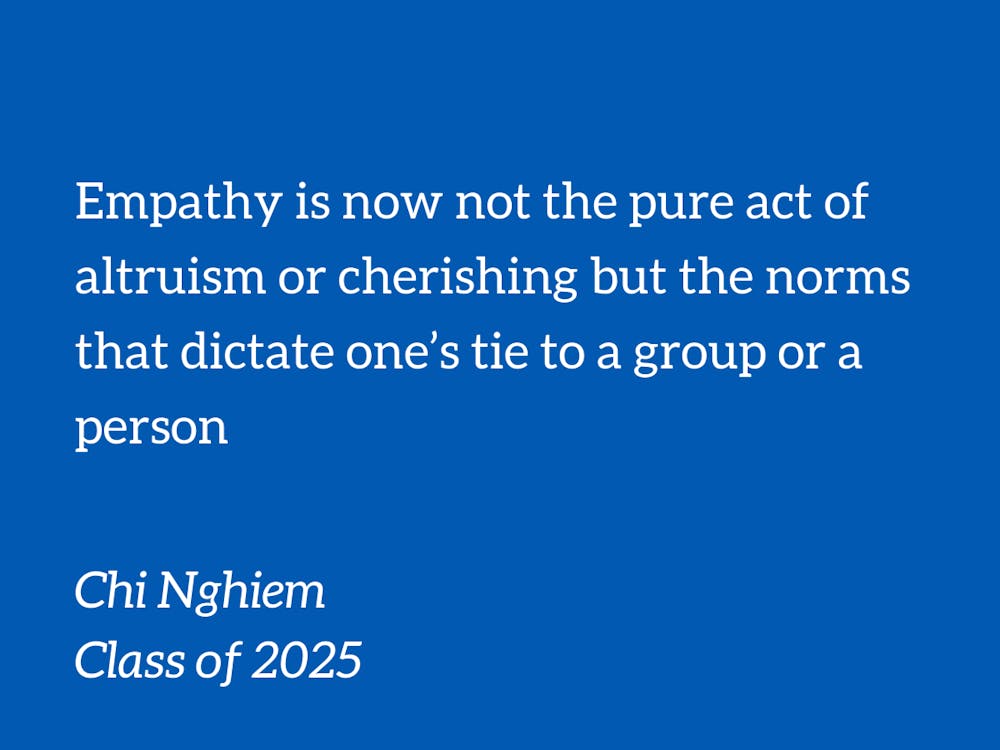Too many times I have heard my entire girl group complain when one member opened up about being unhappy. The doctrine “walk in others’ shoes'' is rife on social media where people expect emotional reciprocity. Take for example a mean co-worker. “Oh, she’s a bitch to me too,” is what is expected of the listener in response to the litany of malicious practices done unto them by the referred “bitch.” When we immerse ourselves in the story of the complainer–whether heartbreaking, resentful or apprehensive–it feels as if we did an empathetic act of a supportive companion. However, the truth is that continual empathy in communication does not necessarily translate into healthy communication.
Most of the time we only empathize with people who are similar to us in a particular aspect or close to us in terms of social background and relationships. Empathy for close friends or people we find similar to us is so effective that we emotionally feel as if we were them, creating emotional compatibility. I loathed the jerk whose contemptuousness my roommate lamented about. Envy is what I and my upperclassman sister share when talking about her fabulous work-hard-play-hard Amazon co-intern. The conversations with my friend about his irksome, vulgar classmate now lend me a spiteful perception of the man. The empathetic spirit I share with the complainers reinforces existing negativities and adds conflict-inducing elements, making the irritation seemingly unresolvable.
I expected listeners to reciprocate with my ramble on the stress of work with a similar level of fatigue and frustration. I needed the affirmation from my partner that I emerged victorious in the fight with my obnoxious teammate. I demanded my friend squads, regardless of their opinions and preferences, to take part in my diatribe against a random outsider. The synchrony of negative feelings serves as a reinforcement of the group’s connection and, in turn, as a tool of ramification against different-minded ones. Empathy is now not the pure act of altruism or cherishing but the norms that dictate one’s tie to a group or a person.
Integrating one’s emotions in understanding another's feelings and thoughts is, in fact, toxic and taxing. The favoritism towards one group will undeniably energize one’s existing polar partisanship, thus intensifying the unnecessarily harsh enmity towards other groups. The stronger the relationship with the person we empathize with is, the more animosity we harbor towards the group deemed to be the struggle-causer. Although our empathy is a pain-killer to people in some situations of loss, bereavement or bad luck, this temporary tranquilizer is also draining to empathizers emotionally, cognitively and physically.
The diffusion of personal and interpersonal life necessitates people’s incorporation of others’ problems into their own. The dependence on others for an innate desire for belonging or the predilection for social attention shapes our efforts to duplicate shared sufferings. Just as people can manage their impression for their own self-interested benefits, people can lose their self-identity to group identity with the drive to be accepted and connected. Unfortunately, the engrossment in other’s businesses not only fails to guarantee philanthropic support but also translates to the self-other convolution of personal affairs.
These pernicious effects are even more extreme to people pleasers—those who pay excessive attention to others’ feelings and sacrifice their comfort to delight others. People-pleasing behavior arises in the context of wanting to be liked and avoiding hostility, constraining the actors to the exhausting work of predicting reactions and perfecting social manners. Except for the endeavor to enhance one’s positive moods, people pleasers are more likely to refrain from unpleasant conversations and to manipulate others into the false countenance of their genuine kindness. We are just as excellent as we are at blurring the line between external countenance of friendliness and inner sincerity of devotion.
Here are some ways to preempt toxic empathy and still strengthen relationships:
- Don’t immediately respond with assurance, but don’t be pontificating and force them to think rationally when they are mentally depleted. Instead of saying, “I also think the decision of your rival is ridiculous,” try to find suitable time and suggest your partner to see problems with a different perspective. Don’t feel as others, but understand their feelings.
- Understand the speakers’ motivations and reasons, but don’t try to feel as if you were them. Be understanding of the fact that their actions originate from dispositional inclination and situational elements. Show them you are aware of their hardships and are ready to support them through this pessimistic phase, while actually promoting constructive thinking. However, don’t try to steer the empathy towards the people involved in this predicament. Know that a person’s sufferings come from one’s subjective evaluation of a complex combination of things, too.
- Encourage immensely! Confirmation of negative prejudices is dangerously vindictive, but compliments and cheers are comforting for any sufferings. Try not to exacerbate the existing moods by being the accomplice. Acknowledging the sufferings and giving compliments for the endurance are better.
Chi Nghiem is a Duke Kunshan University second-year. Her column runs on alternate Thursdays.
Get The Chronicle straight to your inbox
Signup for our weekly newsletter. Cancel at any time.

